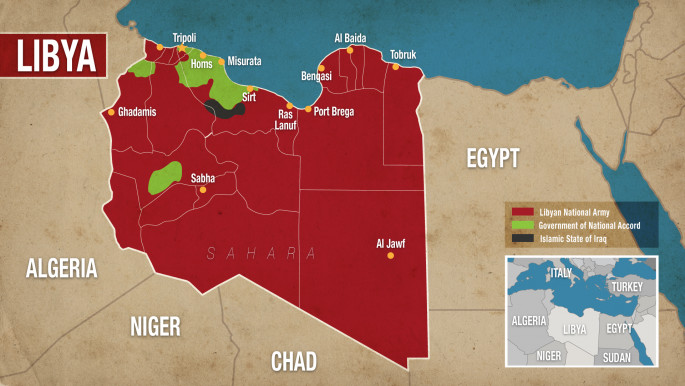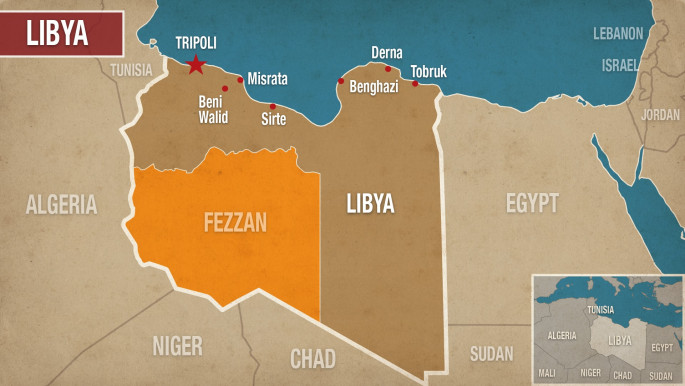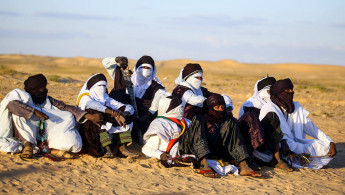A quiet conflict is raging in Libya's desertic south
In the western city of Tripoli, Libya's capital, the Government of National Accord (GNA) under Libyan Prime Minister Fayez al-Sarraj has gained diplomatic recognition from the United Nations but struggled to establish itself on the ground, reliant on support from a constellation of Libyan militias.
In the east, the would-be strongman Khalifa Haftar has used his own militia, the Libyan National Army (LNA), to conquer the cities of Benghazi and Derna and launch an offensive on Tripoli.
 |
|
While the best-known battles of the Libyan Civil War have remained confined to Libya's coast, home to most of the country's population, a quiet conflict has been raging in the desertic south.
There, the GNA and the LNA have competed for the allegiance of several non-Arab ethnic groups. They include the Tuareg, a minority group with a history of marginalisation at the hands of the Libyan state.
Often considered a subgroup of the Berbers, a North African people, the Tuareg form a sizeable minority in Burkina Faso, Mali, and Niger. An additional community inhabits the southern Libyan region of Fezzan, where nomadic Tuareg tribes have worked as merchants and smugglers for millennia.
Gaddafi encouraged the immigration of Tuareg from Mali and Niger and recruited them into his military, through which some Tuareg acquired Libyan citizenship.
The eccentric autocrat heralded them as "Arabs of the south," yet he also discriminated against them, expelling thousands from Libya in the 1980s.
"Before the Libyan conflict, the Tuareg were divided between those with Libyan citizenship and those without," said Claudia Gazzini, the International Crisis Group's senior analyst for Libya. "Gaddafi nonetheless employed citizens and non-citizens alike in his security agencies."
Gaddafi incorporated the Tuareg into his erratic foreign policy, training some to rebel against his Malian and Nigerien rivals. The minority also inspired his notorious, mansion-sized tent.
"The Tuareg fascinated Gaddafi," said Dr Igor Cherstich, a social anthropologist at University College London and author of an upcoming book on the Libyan Revolution.
"Gaddafi romanticised the Tuareg lifestyle, one example being the tent that he always used during travel abroad. Even so, Gaddafi frequently described the Tuareg as Arabs, completely reinventing their identity."
 |
Gaddafi romanticised the Tuareg lifestyle, one example being the tent that he always used during travel abroad. Even so, Gaddafi frequently described the Tuareg as Arabs, completely reinventing their identity |  |
As Gaddafi fought a losing battle against rebels in his own country, some of the Libyan, Malian, and Nigerien Tuareg whom he had bankrolled over the years supported him during his last stand.
When Libyan rebels killed Gaddafi in October 2011, many of the West African Tuareg who had joined his army returned to their countries of origin. Libyan Tuareg, however, suffered reprisals from Arab neighbours who backed the rebellion and blamed the minority as a whole for the actions of pro-Gaddafi Tuareg.
"Under the Gaddafi regime, the Tuareg were partially integrated into a brigade of the Libyan Army called the Islamic Legion," said Dr Ricardo René Larémont, a non-resident senior fellow at the Atlantic Council and a professor of sociology at Binghamton University.
"With the fall of Gaddafi, they lost their erstwhile patron and are largely fending for their own in southern Libya and eastern Mali."
Though Gaddafi had offered the Tuareg opportunities for advancement, he had also deprived the minority of its culture. The pan-Arab strongman had refused to recognise the distinctiveness of the Tuareg ethnicity, but, with his death, Tuareg began asserting their rights and forming associations.
"After the revolution, the Tuareg – and more generally Libyan Berbers – finally felt free to celebrate their cultural heritage," Cherstich told The New Arab.
Prior to the Libyan Revolution, Gaddafi had oppressed his country's minorities, declaring in 2010 that Berbers "no longer existed."
 |
Prior to the Libyan Revolution, Gaddafi had oppressed his country's minorities, declaring in 2010 that Berbers 'no longer existed' |  |
Many Berbers viewed the rebellion against him as a rare opportunity to reclaim their cultural heritage after decades of Arabisation. Following the fall of Gaddafi's government, Berber veterans of the war against him celebrated by placing their flags in cities across Libya.
"It is important to understand that the Tuareg are a Berber ethnic confederation – though, in Libya, they often stress that their identity differs from that of coastal Berbers," said Cherstich. "Under Gaddafi, Berbers were discouraged from using their language and expressing their own culture."
As Libyan warlords backed by regional powers took advantage of the power vacuum sparked by Gaddafi's death, Libya's minorities soon realised that they had little reason to rejoice.
Amid the country's descent into chaos, few of the country's new leaders seemed concerned with the wellbeing of the Tuareg. Instead, well-armed militias prioritised capturing Libya's oil reserves, ousting the Islamic State group (IS) from the Libyan coast, and trafficking migrants from Sub-Saharan Africa to the Mediterranean Sea.
"The Tuareg were controlled and used by Gaddafi, excluded from the most important positions of the regime, and too many times forgotten," said Dr Federica Saini Fasanotti, a non-resident senior fellow at the Brookings Institution and author of Libya 1922–1931: The Italian Counterinsurgency.
"Sarraj has tried to be more inclusive, but certainly what has been done so far cannot be called sufficient."
 |
Under Gaddafi, Berbers were discouraged from using their language and expressing their own culture |  |
Rather than uniting the Tuareg and other Libyan minorities, the aftermath of Gaddafi's downfall has divided the fractious ethnicities further. Just as Tuareg fought on both sides of the Libyan Revolution, they have spent the last eight years clashing with each other on behalf of rival Libyan governments.
"The two main Libyan coalitions are trying to entice Tuareg fighters with offers of citizenship and payment," said Gazzini. "This time, the Tuareg are divided between the LNA and the GNA."
In addition to the internal divisions created by the Libyan Civil War, the Tuareg have battled the Tebu, another minority in Fezzan, and the Awlad Suleiman, a southern Arab tribe.
 |
|
In 2014, simmering tensions between Tebu and Tuareg militias led to clashes in the Tuareg-majority city of Ubari, spreading as far as the southern oasis of Sabha, hometown of the Awlad Suleiman, by 2015.
"While the LNA and various militias are vying for control of the north, the south has become an ungoverned space where the Awlad Suleiman, the Tuareg, and the Tebu are competing for control," observed Larémont. "At this moment, the Tebu have the upper hand."
Alliances always seem to be shifting in Fezzan. In March 2017, representatives from the Tuareg, Tebu, and Awlad Suleiman signed a peace treaty in Rome as a replacement for a failed 2015 ceasefire brokered by Qatar.
By February 2019, Tebu and Tuareg militias were mobilising under the GNA-aligned Tuareg commander Ali Kanna, a veteran of Gaddafi's security forces, after Haftar allied himself with the Awlad Suleiman and the LNA attempted to seize Tuareg-controlled oil wells in the Murzuq Desert.
"After the death of Gaddafi, all the dynamics of the past were cancelled," Saini Fasanotti told The New Arab.
"The people of Fezzan have tried to find a space within the new Libyan reality, but – once again – they have not been sufficiently listened to. Thousands of kilometres away from the capital, they have been seen as an absolutely secondary problem. In this void, inhabitants of the region have carved out their own space that – by the way – already has deep roots.
"The people of Fezzan have always been used to thinking about their own interests, since no one has ever done it for them."
 |
The two main Libyan coalitions are trying to entice Tuareg fighters with offers of citizenship and payment... This time, the Tuareg are divided between the LNA and the GNA |  |
Devoid of consistent allies or patrons, the Tuareg have tended to look to one another as the most reliable partners in their ongoing battle for survival.
As many as 90 percent of Libyans belong to one tribe or another, a relationship that has only grown stronger in the absence of a central government.
"Many of Libya's social groups – including the Tuareg – have turned to tribal networks out of self-preservation in the absence of a unified Libyan state," said Cherstich.
Despite promising signs of unity among the Tuareg and southern Libyan minorities in general, the future of Fezzan looks bleak.
Pointing to economic stagnation, unemployment, a lack of healthcare, poor living conditions, and skyrocketing crime rates in the south, Tuareg activists and community leaders argue that the downfall of Gaddafi has done little to change their status as second-class citizens.
Electrical grids, schools, and water supply networks in Ubari have all but collapsed. Meanwhile, IS has established itself in Fezzan after a coalition of militias banished the militants from the coast several years ago.
"The southern situation is dire," said Gazzini. "Many Tuareg feel the need to join militias to have an income. Others have moved to Tripoli only to be forced out in the recent round of violence."
The GNA and LNA's competition over Fezzan's oil reserves has the potential to reignite tensions not only between the Tuareg, Tebu, and Awlad Suleiman but also among the Tuareg themselves.
Like the GNA, Haftar has earned the allegiance of a Tuareg militia, further dividing the minority.
"If anything, the developments in the north have negatively affected the Tuareg," Gazzini told The New Arab. "The conflict there has not translated into any form of Tuareg empowerment."
The Tuareg represent what has become an all-too-common feature of the world's conflict-prone countries: a well-armed, long-disenfranchised social group deprived of any political avenues to express its grievances.
For now, most Tuareg appear to see the GNA as the lesser of two evils.
"Of course, the situation is fluid," noted Larémont. "It can change at any time."
Austin Bodetti studies the intersection of Islam, culture, and politics in Africa and Asia. He has conducted fieldwork in Bosnia, Indonesia, Iraq, Myanmar, Nicaragua, Oman, South Sudan, Thailand, and Uganda. His research has appeared in The Daily Beast, USA Today, Vox, and Wired.



